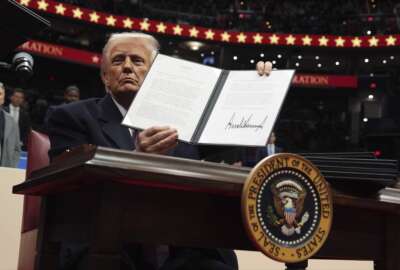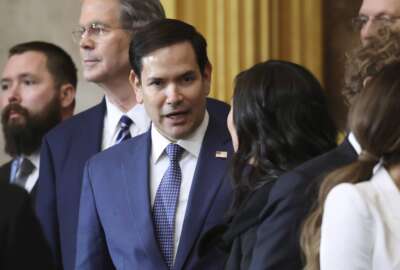The Trump opening agenda is taking most of Congress’ time now
Two horses of the so-called government trifecta — the House and Senate — find themselves deep in the business of the new Trump administration.
Two horses of the so-called government trifecta — the House and Senate — find themselves deep in the business of the new Trump administration. Bloomberg Government deputy news director Loren Duggan joined the Federal Drive with Tom Temin to discuss what’s immediately ahead.
Interview transcript:
Tom Temin: And really, the agenda of Congress is different than it would have been had a different election outcome occurred. So what can we expect in the immediate future? Let’s talk about confirmations. That seems to be all the Senate is really doing right now.
Loren Duggan: Yeah, they have a couple of bills they’re dealing with right now. But as you say, the biggest job right now is getting Donald Trump’s cabinet picks confirmed and in place. We saw that right away on Monday night. The first vote they took was Marco Rubio. He’s now left the Senate and is headed to the State Department to run that. But over the course of this week, in the coming weeks, we’re going to see committee votes, followed by floor votes on some more of the nominees, including those that came out right after basically the inauguration. We had Pete Hegseth come out. We had John Ratcliffe for CIA, folks like that. And there’s still hearings happening this week and next week. So it’s going to be a kind of constant process from here on out to confirm these top picks.
Tom Temin: And Marco Rubio, when he was confirmed for secretary of state, that vote was 99 to 0. Is that simply because he’s a senator and a fellow senator because clearly, the minority now in the Senate is not all a fan of Marco Rubio, the senator?
Loren Duggan: Right. Or Donald Trump’s foreign policy, which he’ll be responsible for carrying out. I think that would be fair to say. But senatorial courtesy does still exist and they probably wanted to back their person and also makes it easier to vote for somebody who’s maybe within the realm of their normal kind of pick for a job, then oppose other people that are still to come down the pipeline. But yeah, 99 to 0, he was one of the 99, I would point out, for Marco Rubio. But that might be the high watermark for some of these. We’ll have to watch.
Tom Temin: Yeah, because Pete Hegseth for the Defense Department was voted out of committee, I think it was 14, 13 or something, which presages what his Senate vote is going to look like, which is likely a squeaker.
Loren Duggan: It could be a squeaker. And these are just simple majority questions. So if you have 50 plus the vice president, you could get a nominee through. So 14 to 13, that’s the ratio that you could see working on the floor if that’s what plays out there as well. But there will be more opposition to that nomination definitely from Democrats. And we’re still watching to see if any Republicans will as well. But that’s not clear at this point.
Tom Temin: And what’s the latest on the so-called conveyor belt of judges? I mean, there was a pretty active campaign going there when President Biden was in office and they got a lot of judges in. How does that work now?
Loren Duggan: Well, the Trump team will come in with some of their own picks and begin nominating those. I haven’t heard exactly when that will start, but we will see as vacancies open up, those positions come through. Now, there could have been even more vacancies to fill, but there was a bill vetoed at the end of the last Congress by Joe Biden that would have added to those judgeships. We’ll have to see if that question comes up again about whether to increase the number of judges and that would create vacancies to fill as well as those that will come up in the normal course of things. But I would expect that to be a later in the process thing because the executive team is really job one at this point.
Tom Temin: And in previous years, including the first Trump administration, but also going back to Clinton, very often, and there was a shortened period of transition for George W. Bush because a contested election in 2000, they haven’t had, if I recall right, as many nominees in process before inauguration as this time around. And does that tend to make the Senate work faster because there’s a bigger load of, ‘Hey, they’ve got to deal with immediately.’
Loren Duggan: Right. Well, they did have some hearings the week before the inauguration when took time to get the Senate up and running and plus, with the party switch there, you had to stay in the committees, that sort of thing. But they had a fair number of hearings. The paperwork has slowed several of these nominations down, whether it was an Office of Government Ethics document they didn’t get or the FBI background check. So that was given as the reason several of those that were scheduled for before the inauguration had to be held till later in the week or coming into this week. So it’s been a little bit slower, but they can try to pick up the pace. If senators agree, they can move these things really quickly. If somebody wants to object and make the rules, draw out to their logical conclusion, it could take days on some of these. And I’m sure that’s what’s being talked about behind the scenes.
Tom Temin: And if you’re a newbie to government in this context, you may not realize you probably at presidential senate confirmed level, even one notch down below that, probably should retain counsel to help you fill out all the paperwork. Some of these forms, national security form is really, really long and detailed and, by golly, they better not find an anomaly in there at some point.
Loren Duggan: Right. There’s a lot of hoops to jump through, if you will, to get one of these positions, paperwork to fill out and ethics documents and all sorts of things that you have to take care of before you even get to your hearing.
Tom Temin: Not that I would shill for attorneys in this town, but that’s just the reality. We’re speaking with Loren Duggan, deputy news director of Bloomberg Government. And you mentioned there are a couple of Senate bills. What’s going on otherwise?
Loren Duggan: In addition to confirming Marco Rubio on Monday, the Senate passed what’s known as the Laken Riley Act. That’s named after a Georgia nursing student who was murdered by somebody in the country illegally. But he had been arrested before for shoplifting or a theft related crime. So what this bill would do is tell DHS, ‘If you arrest somebody for a theft crime, you have to detain them. You can’t let them go.’ Sort of inspired by that. The Senate expanded that bill to also cover, I think, killing a law enforcement officer, other things. So it’s a somewhat broader bill. The House passed a version of it, but they’re going to pass that as well and set it on to Donald Trump as sort of the first big win for Trump will be signing this immigration-related bill, which dovetails with some of his orders. Then both chambers are also taking up an abortion-related measure this week. It would require doctors to take care of a baby that’s born alive or survives an abortion attempt. So that’s kind of tied with a March for Life, a bill that now that Republicans are in charge are bringing up this abortion-related legislation. So those are the big things there. And then also a bill on forest management that’s tied to the California wildfires, which gives them a chance to resuscitate legislation that had been brought up in the past.
Tom Temin: Right. So that’s kind of on the environmental front?
Loren Duggan: Right. Telling different agencies you can do more, but waive some environmental regulations so that you can cut down trees or clear brush or do what you think needs to be done to mitigate fire risk.
Tom Temin: And how about in the House? I mean, there’s still kind of sounds quaint now, but appropriations for 2025 are still somewhere in the agenda.
Loren Duggan: They are on the agenda, not top of mind. A lot of the discussions, budget related, have been on that reconciliation package that they need to assemble at some point and whether to do one bill or two, how to deal with the tax cuts. But the March 14th deadline is still out there. They do need to get to work and get some top line agreement to figure out how to manage that because that is not that far away. And while the Senate is in town for, I think, this is a third of 10 weeks straight, the House will be out of town next week for some GOP retreats where they’re going to set policy. So they really do need to get to work on that pretty soon or figure out if they’re going to extend that stopgap that’s in place beyond that March 14th deadline.
Copyright © 2025 Federal News Network. All rights reserved. This website is not intended for users located within the European Economic Area.
Tom Temin is host of the Federal Drive and has been providing insight on federal technology and management issues for more than 30 years.
Follow @tteminWFED






